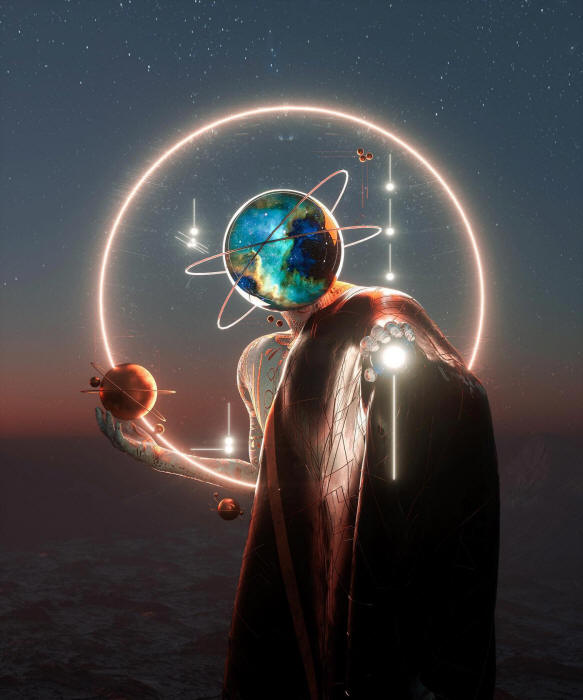|
God of the Universe
by Sarper Baran
that once God is dead, man must live like a god: man must go beyond the limits of his own being, leave his own nature behind and assume the burden, the risk, and the pleasure of divinity."
Octavio Paz
This requires courage and audacity, endurance and insouciance, perseverance and dissonance.
It requires madness and moxie, folly and fortitude, nonconformity and fervidity.
It signifies a stable state of fulfilling one's highest potential through rational activity, virtue, and wisdom.
Unlike
happiness, which can be temporary, eudaimonia is a deeper, active,
and enduring state that results from living a virtuous and
meaningful life according to one's own values.
Coined by ancient Greek philosopher Heraclitus and later introduced into modern psychology by Carl Jung, describes the natural tendency for things to turn into their opposite, especially when pushed to an extreme.
In essence,
To achieve eudaimonia, one must engage with this alchemical process while allowing the self to be reshaped through cycles of destruction and renewal...
"To be fully alive, fully human, and completely awake is to be continually thrown out of the nest." Pema Chödrön
Chödrön's insight captures the essence of this process.
Eudaimonia is not a static state but a dynamic one, requiring you to surrender comfort and certainty. Each time you are "thrown out of the nest," you confront the opposite of your current state:
By embracing these shifts, you refine your being, much like a blade
sharpened on a whetstone through iterative cycles of friction.
...is a practical application of enantiodromia.
Each cycle of experience sharpens your understanding, stripping away illusions and revealing deeper truths.
This oscillation is neither failure nor victory but progress - a refining process that brings you closer to eudaimonia.
By viewing life as an iterative journey, you embrace the inevitability of change and use it as a tool for growth.
Put your Ego on a Leash
"The Soul demands your folly, not your wisdom." Carl Jung
The ego, with its focus on status (cultural conditioning), certainty (rigid religiosity), and self-preservation (comfort zone dependence), often resists the transformative pull of enantiodromia.
Yet eudaimonia requires you to leash the ego, allowing the soul - your deeper, more authentic self - to lead.
This process involves embracing
vulnerability and folly, as Jung suggests. The soul thrives in the liminal space where opposites meet
- between courage and fear, joy and
sorrow, individuality and interconnectedness.
Make
sure the Ego works for the Soul and not the other way around...
is to forget the self."
Dogen
Through enantiodromia, the self's obsession with identity
- its need to define
and defend itself - gives way to its opposite: a spacious, selfless
awareness.
This is a key to eudaimonia:
Through No-mind, you're able to elevate yourself above the battlefield of the human condition.
You see the big picture despite your small picture ego. From this strategic advantage, you're able to utilize cognitive shifts in perspective.
Meditation, mindfulness, and creative immersion can facilitate this
shift, allowing you to experience moments of No-mind where
eudaimonia emerges naturally, like a river finding its True North.
"But now a great thing in the street G.K. Chesterton
Through enantiodromia, this death gives rise to its opposite:
To achieve eudaimonia, you must move beyond external authorities and dogmatic beliefs while embracing a spirituality that is personal, dynamic, and experiential.
This is about transcending religion's limitations to discovering a God (or a sense of the divine) that pulses through all existence.
By killing the rigid "religious god," you resurrect a spiritual God that invites you to live as a co-creator, embodying divine creativity and personal responsibility.
A religious God implies a deity bound by dogma, institutions, and historical texts, whereas a spiritual God is a more personal, internal, and universal or even mystical experience of the sacred.
This simple shift in perspective is a move from external authority
to internal authenticity. It paves the way for individuals to seek
divinity or meaning in more personal, existential, or even poetic
forms.
If, as Mark Twain said,
...then the delayed perfection of the religious
God must be cooked into the continuous improvement of Truth, lest we
starve at the table of delusion.
is to make us aware of the magic, mystery and wonder of the world; it is to educate the senses to see the ordinary as extraordinary, the familiar as strange, the mundane as sacred, the finite as infinite." Novalis
Iteration serves as the whetstone, sharpening your being through cycles of trial and error. The ego, leashed by the soul, learns to surrender its need for control, embracing the folly and wisdom of the deeper self.
Forgetting the self opens the door to No-mind, a state of pure
awareness where opposites dissolve. And by releasing dogmatic
notions of God, you awaken to a living spirituality that infuses
every moment with meaning.
As Chödrön suggests,
In practice, this might look like a daily commitment to self-reflection, meditation, or creative expression, where you confront and integrate your inner contradictions.
It might mean embracing moments of discomfort as opportunities for growth or seeking the divine in the ordinary interactions of life.
By living in alignment with enantiodromia, you become, as Paz suggests, like God:
|


